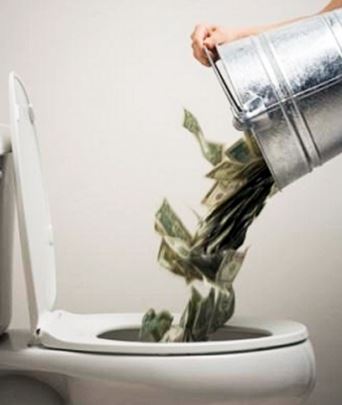By Jon Coupal – March 26, 2023
In last month’s State of the Union address, President Joe Biden chose to spend an inordinate amount of time on matters that most Americans don’t care about. Not much was said about the important issues of border security, inflation, crime, or China’s surveillance balloon that traversed over the entire U.S. before – belatedly – our Commander in Chief decided that it should be shot down.
Among the more trivial topics that Biden focused on is so-called “junk fees.” He urged Congress to pass a new “Junk Fee Prevention Act” which would curtail extra fees on the sale of online entertainment tickets; certain airline fees; early termination fees for TV, phone, and internet service; and resort and destination fees.
To be sure, these add-on charges can be annoying, but there is a huge difference between whether such fees should be disclosed in advance (they should) or whether banning such fees is government overreach at its worst. As noted by the Wall Street Journal in a February 13, 2023, editorial (The Junk Economics of “Junk Fee” Politics), prohibitions of additional services at higher costs actually reduces consumer choice. Even worse, it “will result in higher prices or fewer services for lower income Americans.”
Not to be outdone, California’s progressive politicians quickly jumped on the Biden “junk fee” bandwagon, introducing several bills targeting what they claim are either deceptive or excessive charges imposed by private businesses. For example, SB 611 (Senator Caroline Menjivar, D – Panorama City/San Fernando Valley) would require landlords to clearly state to potential renters what their up-front and monthly payments will be, including all required fees, to rent the apartment. But, under current law, this information is already required to be disclosed by the landlord.
Another, AB 1222 (Tina McKinnor, D -Inglewood) purports to provide greater transparency by ensuring that rental car companies quote rental rates that contain the entire amount, including all applicable taxes and additional fees or charges, necessary to rent the vehicle. But, like SB 611, this bill is more posturing than substantive. As anyone who has booked a rental car knows, the amount of the charge is clearly disclosed prior to the rental.
More insidious is SB 680 (Senator Nancy Skinner, D – Berkeley) which would prohibit auto dealers from charging above the Manufacturer’s Suggested Retail Price for electric vehicles. All this bill would accomplish would be to ensure that highly popular vehicles that are in limited supply would be shipped to other states where a market-based sales price could be negotiated. If the goal was to put more EV’s on the road in California, this bill could easily have the opposite effect.
Even a cursory review of the half dozen or so bills targeting “junk fees” exposes that most are simply posing as solutions without any real impact or substance. Those that are substantive are more likely to produce unintended consequences at best or, at worse, outcomes that are the exact opposite of what they claim.
But, if the California legislature is serious about “junk fees,” we have an idea. Let’s go after all the extraneous fees, charges and assessments imposed by government that frequently do no good nor provide any benefit to taxpayers or ratepayers. The list is endless.
Fees imposed by the state include lumber “fees” imposed on all retail sales of most wood products, Electronic Waste Recycling Fee, Energy Resources Surcharges, California Tire Fee, Natural Gas Surcharges (because the price of natural gas apparently isn’t high enough), Marine Invasive Species Fee, Childhood Lead Poisoning Prevention Fee (imposed on businesses that don’t produce products containing lead), and literally hundreds of additional fees.
Local governments are notorious for imposing a myriad of miscellaneous fees usually disconnected from any benefits conferred on taxpayers. For example, some local governments are imposing “vacant lot” fees based on the theory that vacant properties need to be “inspected” periodically. These fees are imposed whether any inspections ever occur. The same is true of other “inspection fees” such as rental housing fees and fire inspection fees.
California homeowners are all too familiar with “junk fees” every year when they receive their property tax bills. On top of the regular property tax, limited to 1% thanks to Proposition 13, homeowners see a list of “below the line” items that include flood control assessments, lighting and landscaping assessments, Mello-Roos taxes (in many neighborhoods) and a litany of other miscellaneous fees, charges, taxes, and assessments.
California taxpayers hope that, as the legislature pursues what it labels as “junk fees,” it gives at least as much attention to government imposed excessive fees. Such fees are a much bigger threat to the economic well-being of citizens than those imposed by airlines or Ticketmaster.
Jon Coupal is president of the Howard Jarvis Taxpayers Association.


